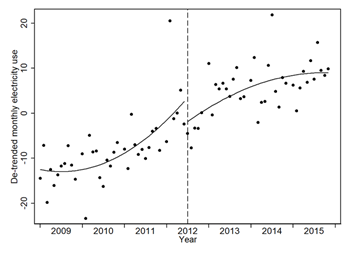Mapping the impact of tiered pricing reform on China’s residential electricity use
Published 01 November, 2021
In many economies worldwide, electricity companies charge their residential customers a higher retail rate than their industrial and commercial customers. However, in China, the roles are reversed, with businesses paying higher rates for electricity to subsidise private households. This not only leads to companies facing disproportionately high electricity bills (potentially impacting their ability to compete globally), it can also encourage over-consumption of electricity by the residential households enjoying subsidised rates.
To incentivise residents to be more energy-efficient, the Chinese government introduced a tiered electricity pricing reform in July 2012. The reform, which applies to 29 of the country’s 34 provincial-level administrative divisions, requires the provincial governments to set three levels of electricity usage on a monthly or annual basis. While the electricity price in the first tier remains unchanged, the other two tiers’ prices grow progressively higher.
Researchers at China’s Peking University and Zhongnan University of Economics and Law, set out to establish whether the tiered electricity pricing reform had reduced residents’ electricity usage. Their results feature in a paper published in the KeAi journal China Economic Quarterly International. The researchers drew on county-level data from four provinces, and province-level data from 21 provinces, covering the years 2009-15. They then used the regression discontinuity method to understand the impact of the tiered pricing reform. They found that, on a county-level, the reform had reduced the monthly electricity use per household by 6.5 kWh, while for provinces this figure was 8.9 kWh. This accounted for 6.1% and 7.1%, respectively, of monthly electricity use per household prior to the reform. Counties and provinces with a more drastic policy shift showed a larger decrease in residential electricity use.
According to author Xiumei Yu: “The results of the paper have several policy implications. The fact that the average residential electricity use was reduced by the tiered pricing reform shows that this kind of reform can encourage residents to reduce their electricity use. In addition, our results suggest that policy intensity can be a powerful tool to guide residents to use electricity more efficiently.”

Contact the author: Xiumei Yu, xiumeiy@zuel.edu.cn